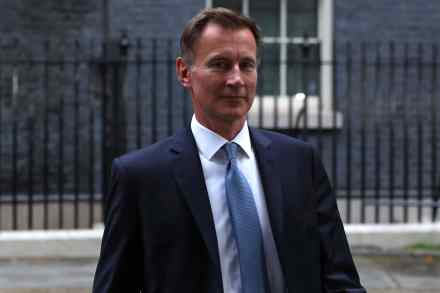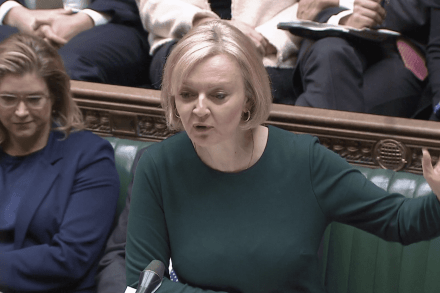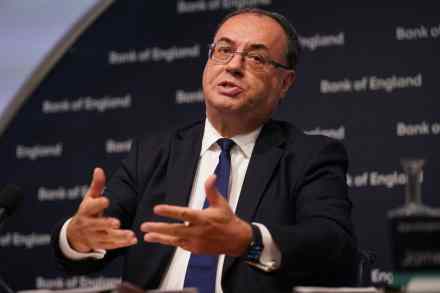Why did Boris pull out?
18 min listen
Kate Andrews, James Forsyth and Katy Balls discuss the surprise withdrawal of Boris Johnson from the Conservative leadership race.

Kate Andrews is deputy editor of The Spectator’s World edition.
18 min listen
Kate Andrews, James Forsyth and Katy Balls discuss the surprise withdrawal of Boris Johnson from the Conservative leadership race.


This morning the BBC hosted a current Tory leadership contender and the leader of the opposition on Sunday with Laura Kuenssberg. Yet the most insightful comments came from one of the panel members: Lord Mervyn King, former governor of the Bank of England between 2003 and 2013. Asked by Kuenssberg about the narrative that’s doing
In the brief time Sajid Javid was chancellor to Boris Johnson, he spelled out to The Spectator his ‘low for long’ theory about rates: a theory which would enable the new prime minister’s ambitious spending agenda. Speaking to Fraser Nelson in December 2019, Javid was confident that the era of ultra-low interest rates and extremely


Next week we will have a new prime minister (again), but the economic problems facing the country will remain the same. This morning’s update from the Office of National Statistics shows public sector net borrowing was £20 billion last month: the second-highest borrowing September record and significantly higher than the Office for Budget Responsibility’s last
Liz Truss did not think that spending cuts would be a major part of her agenda. She and her first chancellor, Kwasi Kwarteng, were confident that markets, having lent Britain billions of pounds to cover the cost of the lockdowns, would be more than happy to do the same to transform the economy. Their argument


75 min listen
Fraser Nelson, James Forsyth, Katy Balls and Kate Andrews discuss plans to stop spiralling inflation – and a spiralling government.

In all the recent economic chaos, it’s been easy to overlook one of the most important factors contributing to the cost-of-living crisis: inflation. But this morning’s update from the Office for National Statistics brings it back into focus, as CPI inflation rose back into double digits in September: now at 10.1 per cent on the
17 min listen
28 per cent of the world’s fertiliser supply comes from Russia and Ukraine. Since war broke out in February, fertiliser prices have rocketed to record highs because of the disruption. British farmers are under pressure as the industry deals with higher energy costs at the same time; while consumers are facing higher food prices. Is

Jeremy Hunt set out at the start of the weekend with one goal in mind: that when the gilt markets reopened on Monday, the cost of government borrowing would not surge further. Ideally, it would start to fall. In this sense, it’s been a successful day for the new Chancellor. The Treasury’s early morning update

18 min listen
Chancellor Jeremy Hunt gave a statement this morning in which he outlined plans to scrap ‘almost all’ the tax measures announced by his predecessor, Kwasi Kwarteng just four weeks ago. In one of the largest U-turns in history, the markets have become the most important force in British politics. James Forsyth, Katy Balls, Kate Andrews

When Jeremy Hunt took the role of chancellor last week, he was thought to have done it under instructions from Liz Truss that he was not to roll back any more of the mini-Budget. That instruction hasn’t stuck. Today’s update on the ‘medium-term fiscal statement’ was not so much a detailed plan to balance the

The government’s position has become so precarious – and its credibility with the markets so low – that even waiting another two weeks to announce the ‘medium term fiscal statement’ became too big a gamble. By moving the announcement forward to today, Jeremy Hunt is removing the uncertainty of creating a two-week gap between the

This morning on the media round, Jeremy Hunt followed in the footsteps of Tory chancellors before him warning about the ‘very difficult decisions’ that lie ahead. The new chancellor’s language and tone could easily be compared to George Osborne after the financial crisis, explaining to the country why government spending needed to be curbed. Or

After two major U-turns over last month’s mini-Budget and the sacking of a chancellor, what’s left of Liz Truss’s economic agenda? Parts of it remain intact. But it’s now shaping up to be significantly different from what the Prime Minister intended when she entered Downing Street. The key assumption behind Trussonomics as it was developed


13 min listen
Prime Minister Liz Truss has sacked her Chancellor Kwasi Kwarteng and replaced him with Jeremy Hunt. By removing her closest ideological ally. Can she save herself? Kate Andrews speaks to Katy Balls and James Forsyth. Produced by Natasha Feroze.
The mini-Budget was a spending spree. The ‘medium-term fiscal plan’ was meant to explain the funding. But what exactly is going to be in it? Liz Truss and Kwasi Kwarteng were thought to have (finally) come to terms with the need to address the need for some restraint, after their mini-Budget led to market chaos which


Liz Truss and Rishi Sunak spent the summer fighting it out in the Tory leadership contest, debating how they would make the economy grow. It turns out that, while that discussion raged on, the economy was contracting: GDP fell in August by 0.3 per cent, according to figures from the Office for National Statistics. This is an unexpected
Speculation has been growing that the Bank of England might announce an extension of its emergency gilt-buying programme which is set to end on Friday. Despite the Treasury moving forward its ‘medium-term fiscal plan’ announcements from November to the end of this month, gilt yields have been rising yet again this week in the lead-up to


14 min listen
Parliament is back today and Kwasi Kwarteng is facing questions from the opposition as well as from those within his party. How much pressure is he under? Also on the podcast, looking ahead to another fiscal event at the end of the month, are we heading for a series of departmental spending cuts? What would

When Kwasi Kwarteng stood up to deliver his mini-Budget last month, the assumption by the government was that the markets would jump for joy over its growth strategy. Less than three weeks later, the Bank of England is staging its third intervention to keep the UK’s bond market afloat, warning this morning of ‘material risk’